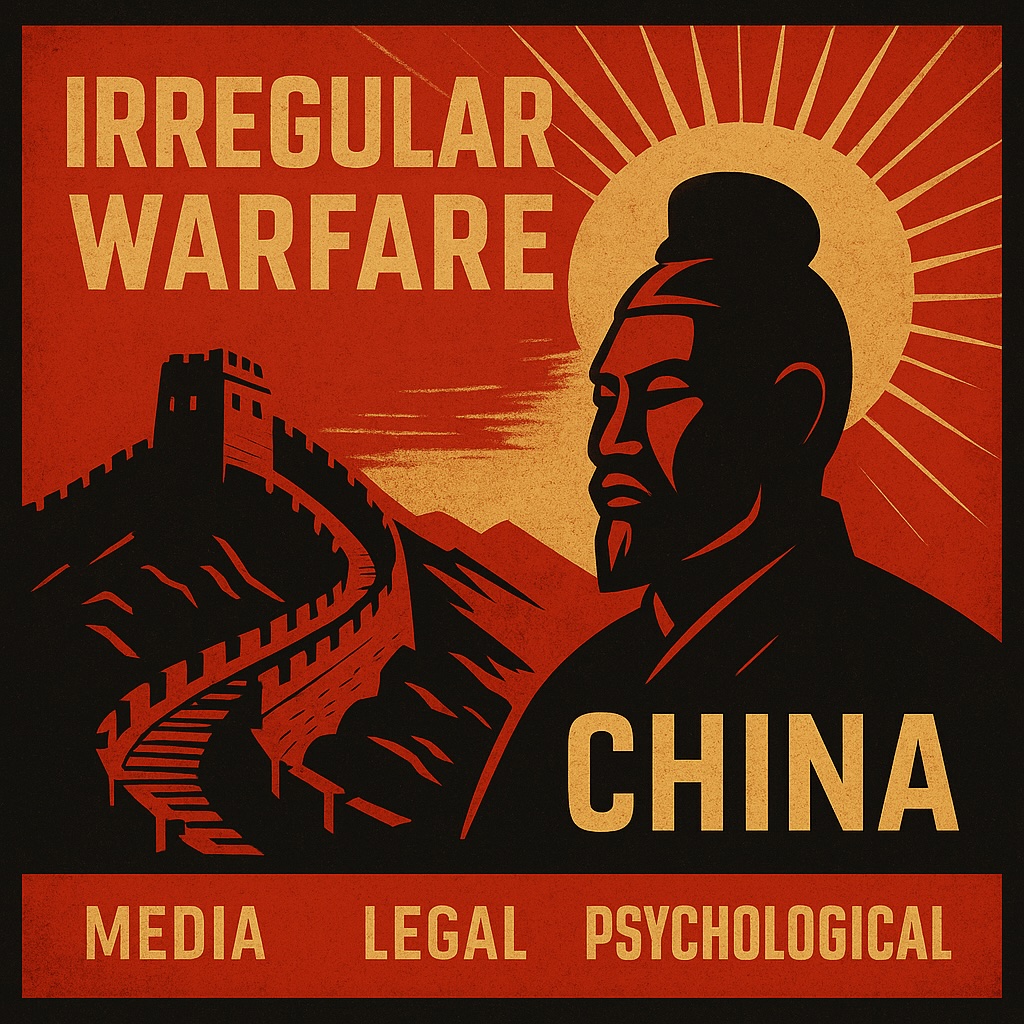China’s Old yet Renewed Approach to Irregular Warfare: The Three Warfares

With lots of recent press, China’s strategy for irregular warfare is under pressure. It is both ancient and modern, rooted in the philosophies of Sun Tzu but adapted for the information age. Central to this strategy is the concept of the Three Warfares: Media (Public Opinion), Legal (Lawfare), and Psychological Warfare. These interlocking tools are designed to shape perceptions, control narratives, and undermine adversaries—often without firing a shot.
Understanding Irregular Warfare in the Chinese Context
Irregular warfare, as practiced by China, is not an auxiliary to traditional military operations but a core element of its strategy. The People’s Liberation Army (PLA) integrates irregular tactics—subversion, intelligence, and influence—seamlessly with conventional capabilities. The objective is to win without fighting, leveraging all instruments of national power to incrementally shift the balance in China’s favor.
The Three Warfares Explained
1. Media Warfare (Public Opinion Warfare)
- Objective: Shape domestic and international perceptions to legitimize China’s actions and delegitimize adversaries.
- Methods: Use state-controlled media, social media, and international news outlets to spread favorable narratives, discredit opponents, and build support for Chinese policies.
- Examples:
- Promoting China’s historical claims in the South China Sea.
- Highlighting “foreign interference” as a threat to Chinese sovereignty.
- Mobilizing overseas Chinese media to echo Beijing’s messaging.
Media warfare is about controlling the information environment, influencing both the Chinese public and international audiences. The goal is to seize the “decisive opportunity” to control public opinion and create a favorable environment for China’s objectives.
2. Legal Warfare (Lawfare)
- Objective: Use legal arguments and manipulation of international law to assert China’s interests and challenge adversaries.
- Methods:
- Selectively interpreting international law to justify territorial claims.
- Filing lawsuits, submitting position papers to international bodies, and using legal language to support Chinese actions.
- Undermining adversaries’ legal positions by exploiting ambiguities in international law.
Legal warfare seeks to provide a veneer of legitimacy to China’s actions, making it more difficult for adversaries to build international coalitions against Beijing. For example, China has used legal arguments to justify its artificial islands in the South China Sea and to challenge U.S. military activities in the region.
3. Psychological Warfare
- Objective: Influence the will, decision-making, and morale of adversaries while bolstering China’s own resolve.
- Methods:
- Disseminating disinformation and propaganda.
- Using threats, intimidation, and demonstrations of military force to sow doubt and fear.
- Employing economic and diplomatic pressure to divide alliances and erode trust among opponents.
China’s psychological warfare targets not only military adversaries but also civilian populations, policymakers, and allied nations. Tactics include spreading rumors, leveraging social media disinformation, and using economic coercion to create uncertainty and hesitation among opponents.
Integration and Execution
The Three Warfares are not siloed; they are mutually reinforcing. Public opinion warfare builds legitimacy for legal warfare, while legal warfare provides authority for psychological operations. Together, they create a comprehensive approach that weakens adversaries from within, often before any open conflict begins.
China’s approach is a whole-of-government effort, involving not just the PLA but also state agencies, media organizations, the United Front Work Department, and even overseas Chinese communities. This integrated strategy reflects a belief that war is not just a military struggle, but a contest waged across political, economic, legal, and informational domains.
What’s Next
China’s irregular warfare strategy, centered on the Three Warfares, is a sophisticated campaign to shape the strategic environment in its favor. By leveraging media, law, and psychological tools, Beijing seeks to achieve its objectives without direct confrontation, embodying Sun Tzu’s maxim: “The supreme art of war is to subdue the enemy without fighting.”



